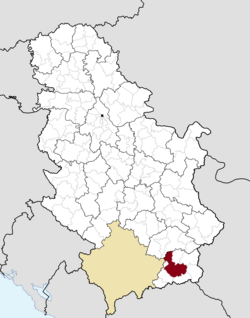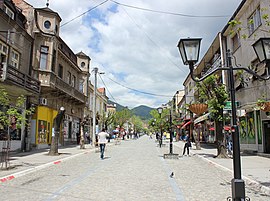
Back فرانيي Arabic Уране BE-X-OLD Враня Bulgarian Vranje BS Вранье CE Vranje (kapital sa distrito) CEB ڤرانیێ CKB Vranje Czech Vranje Danish Vranje German
Vranje
Врање (Serbian) | |
|---|---|
| City of Vranje | |
|
From top: Main pedestrian zone, Courthouse in Vranje, County Building, National Museum, Prohor of Pčinja Monastery, White Bridge, Markovo Kale fortress | |
 Location of the city of Vranje within Serbia | |
| Coordinates: 42°33′N 21°54′E / 42.550°N 21.900°E | |
| Country | |
| Region | Southern and Eastern Serbia |
| District | Pčinja |
| Municipalities | 2 |
| Settlements | 105 |
| Government | |
| • Mayor | Slobodan Milenković (SNS) |
| Area | |
| • Urban | 36.96 km2 (14.27 sq mi) |
| • Administrative | 860 km2 (330 sq mi) |
| Elevation | 487 m (1,598 ft) |
| Population (2022 census)[2] | |
| • Rank | 16th in Serbia |
| • Urban | 55,214 |
| • Urban density | 1,500/km2 (3,900/sq mi) |
| • Administrative | 74,381 |
| • Administrative density | 86/km2 (220/sq mi) |
| Time zone | UTC+1 (CET) |
| • Summer (DST) | UTC+2 (CEST) |
| Postal code | 17500 |
| Area code | +381(0)17 |
| ISO 3166 code | SRB |
| Car plates | VR |
| Website | www |
Vranje (Serbian Cyrillic: Врање, pronounced [ʋrâɲɛ] ) is a city in Southern Serbia and the administrative center of the Pčinja District. The municipality of Vranje has a population of 74,381 and its urban area has 55,214 inhabitants.
Vranje is the economical, political and cultural centre of the Pčinja District in Southern Serbia. It was the first city from the Balkans to be declared UNESCO city of Music in 2019.[3][4] It is located on the Pan-European Corridor X, close to the borders with North Macedonia, Kosovo and Bulgaria. The Serbian Orthodox Eparchy of Vranje is seated in the city, as is the 4th Land Force Brigade of the Serbian Army.
- ^ "Municipalities of Serbia, 2006". Statistical Office of Serbia. Retrieved 28 November 2010.
- ^ "2011 Census of Population, Households and Dwellings in the Republic of Serbia: Comparative Overview of the Number of Population in 1948, 1953, 1961, 1971, 1981, 1991, 2002 and 2011, Data by settlements" (PDF). Statistical Office of Republic Of Serbia, Belgrade. 2014. ISBN 978-86-6161-109-4. Retrieved 27 June 2014.
- ^ "UNESCO designates 66 new Creative Cities | Creative Cities Network". en.unesco.org. Retrieved 2 November 2019.
- ^ "Vranje među kreativnim gradovima Uneska". www.novosti.rs (in Serbian (Latin script)). Retrieved 2 November 2019.








